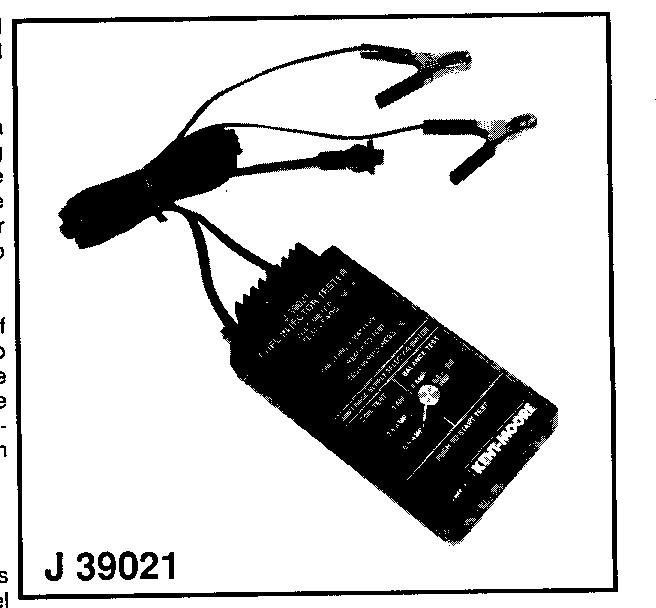SMU - SEC. 6E3, 6E2 DRIVEABILITY AND EMISSIONS

SUBJECT: INFORMATION ON INTRODUCTION OF J 39021 FUEL INJECTOR TESTER
VEHICLES AFFECTED: 1990-93 PASSENGER CARS AND "U" VANS
This bulletin is being revised to correct the bulletin number which has been changed from 93-6E-116 dated April 15/93 to 93-6E-121 dated May 15/93
In January 1993, Kent-Moore shipped to dealers a new Fuel Injector Tester (J 39021). This tool is being shipped as part of the Essential Tool Program. The Tester will detect intermittent coil failures that may be missed using an ohmmeter alone since the ohmmeter does not load the injector coil with enough current to detect intermittent coil failures.
The Fuel Injector Tester (J 39021) is capable of testing all major brands of fuel injectors; however, to use this tool with non-GM injectors you will need the appropriate injector connector adapter and the injectors resistance specifications. Refer to instructions included with tester for additional information on non-GM applications.
BACKGROUND
The use of injector cleaners and gasoline blends containing high levels of alcohol may cause fuel injectors to become faulty. Alcohol may attack the injector's solenoid coil wire and insulation resulting in a shorted or open solenoid coil. Damaged coils will result in driveability problems due to improper fuel delivery.
COIL TEST DESCRIPTION
The test procedure also requires the use of the J 39200 Digital Volt Meter (DVM). The J 39021 Fuel Injector Tester supplies one of three fixed current values throughout the duration of the test. Selection of a supply current value (0.5, 2.5, or 4.0 amp) is based on the injectors specified resistance. When the push-to-start-test button is depressed, the tool energizes the injector solenoid coil for five (5) seconds.
The condition of the injector solenoid coil (Pass/Fail) is determined by the voltage reading displayed on the DVM while the injector is energized. Injector voltage range and resistance specifications are provided in the Application Table.

General Motors bulletins are intended for use by professional technicians, not a "do-it-yourselfer". They are written to inform those technicians of conditions that may occur on some vehicles, or to provide information that could assist in the proper service of a vehicle. Properly trained technicians have the equipment, tools, safety instructions and know-how to do a job properly and safely. If a condition is described, do not assume that the bulletin applies to your vehicle, or that your vehicle will have that condition. See a General Motors dealer servicing your brand of General Motors vehicle for information on whether your vehicle may benefit from the information.
